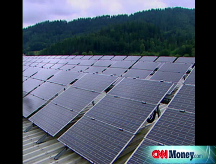Renewable energy's biggest wish
Despite promises of massive investment projects and fancy prizes, lawmakers are skimping on the one thing the renewable energy industry says it needs most - tax breaks.
NEW YORK (CNNMoney.com) -- While politicians of all stripes are vying to be seen as saviors in the energy crisis, Congress isn't giving renewable energy investors the one thing they say would help the most - long-term tax credits.
Lawmakers from both sides of the aisle want the nation to move away from fossil fuels and become more energy independent.
Barack Obama is pushing his $150 billion, Apollo Project-style plan to invest in renewable energy. John McCain is calling for a $300 million prize for any person or company who makes major advances in electric car batteries, and lower corporate tax rates across the board.
But it's the tax credits for renewable energy projects - currently hung up in partisan fighting over how to pay for them and in danger of expiring - that those who actually invest big money into renewable energy say they need the most.
"What I really want is to not be talking about this every cycle," Bill Green, managing director of venture capital company Vantage Point Venture Partners, said at a recent renewable energy conference. "We face a lack of predictability, and we need a policy that transcends a certain election."
The tax credits are substantial.
They currently give wind, geothermal and biofuels projects 2 cents for every kilowatt hour produced. The current market price for electricity is about 5 cents per kilowatt hour, so it works out to a subsidy of about 40%, according to the Energy Information Administration.
For solar, businesses and individuals can get 30% of the cost of a solar plant or home installation refunded by the government.
These tax credits have been around in some form since the early 1990s, but since the late 1990 have only been renewed on a yearly basis.
That's a problem for anyone trying to develop large sources of renewable energy.
People putting solar panels on their roof usually are able to take advantage of the tax credit because they should be able to have the panels up and running in less than a year.
But finding someone to pony up the money to build a massive utility-sized solar project - which can take three to six years to build - is a lot harder if the long-term availability of the tax credit is uncertain.
"If you do just one year extensions, you don't create market stability for the larger projects," said Monique Hanif, spokesperson for the Solar Energy Industries Association.
In addition, Hanif said it is driving manufacturing jobs overseas.
Solar panels are heavy and expensive to ship, so in many cases in makes sense to build them in the country where they will be used.
But if the market in this country is uncertain, it makes it likely the companies that make solar panels will build their factories somewhere else.
Hanif said one solar company has already put plans to build a manufacturing plant in the United States on hold.
"Instead of creating a market where we can capture leadership, countries like Germany, Spain and China are way ahead of us," she said.
Congressional watchers say the tax breaks have only been extended one year at a time because it's cheaper.
"All tax breaks have to be paid for, and on the 1-year window they have to come up with less money," said Mark Luscombe, principal analyst at tax information publisher CCH.
There's also the belief that someday soon the renewable energy industry won't need government assistance, and extending the tax breaks too far into the future would be unnecessary, said Luscombe.
Lawmakers say they are aware of the problem and are trying to extend the tax credits on a long-term basis.
"It looks like the revenue for long-term extensions will materialize soon," an aid to Sen. Chuck Grassley (R-Iowa), ranking member of the Senate Finance Committee, said in an email. "Sen. Grassley supports cutting back some tax incentives for conventional energy production and re-channeling that revenue into long-term extensions of the alternative energy incentives."
Max Baucus (D-Mont.), chairman of the Senate Finance Committee, also said he's on board. His most recent proposal included an eight year extension for solar power, said an aid.
But just because it can get past the finance committee doesn't mean it will pass the larger Congress.
The credits are currently bundled together with other tax extensions, with Democrats and Republicans fighting over how they'll get funded.
A spokesman for Speaker of the House Nancy Pelosi (D-Calif.) said there's a good chance the tax credits will get moved into a larger energy bill that Congress is expected to take up when they return from recess Sept. 8.
The larger energy bill is expected to center around some type of trade off - a limited expansion of offshore drilling pushed for by the Republicans in exchange for higher taxes on the oil companies and more funding for renewable energy, championed by the Democrats.
But with the presidential election on the horizon and the end of the year fast approaching, Congress only has a few weeks to act.
"There are just so many other distractions right now," said the solar association's Hanif. "There's a 50-50 chance this could expire." ![]()









